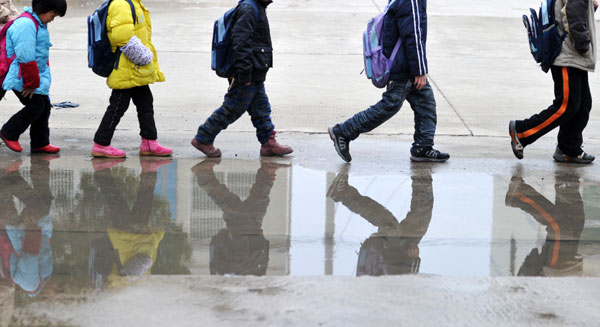
HIV sufferers, considered at risk of transmitting the virus to others, will receive antiretroviral therapy upon testing positive, a senior health official revealed.
Up until now people who were HIV-positive in China only received free ART when their CD4 count — white cells that fight infection — fell below 350 cells per cubic millimeter.
 |
|
Five children, orphaned by AIDS, walk to school in Fuyang in East China's Anhui province. Photo by Xinhua |
Doctors are being instructed to prescribe the treatment upon diagnosis for patients in high-risk groups, including homosexual men, sex workers and couples where only one partner is infected.
"The new strategy will help prevent sufferers from developing full-blown AIDS," Wu Zunyou, director of the National Center for AIDS and Sexually Transmitted Disease Control and Prevention, said.
"Equally important, it will help reduce the possibility of secondary infections by lowering the viral load of sufferers with early medication," he said during the 2012 International AIDS Conference in Washington.
An international study last year found that a 96 percent reduction in transmission occurred when a HIV-positive partner began ART early.
A similar small-scale pilot program in China, targeting couples, has shown a 55 percent decrease in transmission among those where the HIV-positive party was on ART.
"Treatment as prevention is the biggest scientific revolution in HIV/AIDS response since the first antiretroviral drugs became available in 1996," said Elly Katabira, president of the International AIDS Society and the conference's chairwoman.
Wu said that this approach has been integrated into the treatment criteria in China.
Early treatment also helps curb drug resistance, according to Zhao Yan, deputy director of the AIDS treatment and care division of the center.
She said at least 46,000 sufferers on the Chinese mainland will be put on ART this year. Last year, about 45,000 began receiving ART, almost twice that of 2010.
China has an estimated 780,000 HIV sufferers and more than 150,000 are receiving ART, according to the government figures.
"To implement the new strategy, however, requires further scaled-up testing and early detection," Wu said.
More than 80 million HIV screenings were carried out last year, he said, but nearly 28 percent of newly diagnosed cases already had full-blown AIDS.
"That indicated that the HIV testing efforts should be better targeted, which is why they are being expanded," Zhao said.
Other challenges for implementation, she said, include relatively low awareness among doctors about early treatment, a lack of detailed guidelines to enforce the treatment as prevention strategy, and reluctance among sufferers to receive early ART, citing inconvenience and side effects.
To address the issue, the government will enhance education and strengthen mobilization efforts, particularly among civil societies, she said.
The ART drug regimen will also be optimized, she added, to facilitate and encourage early treatment.
Contact the writer at [email protected]







